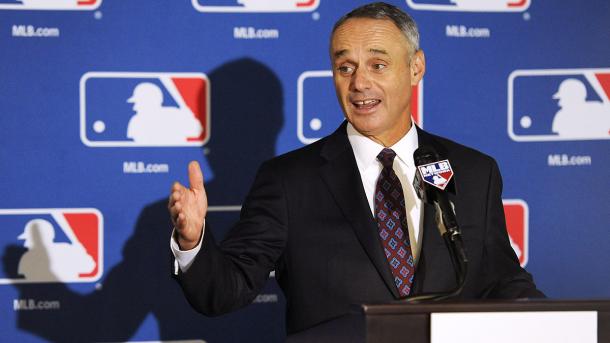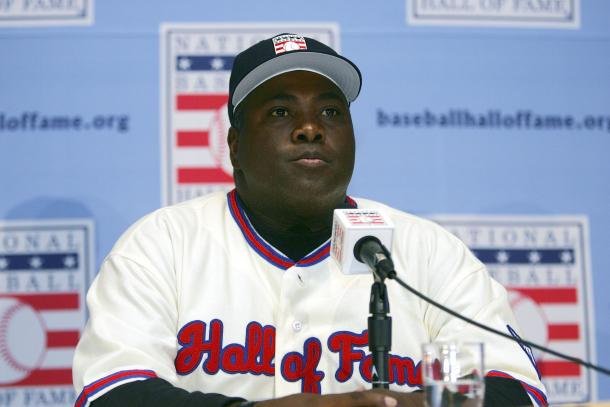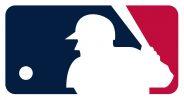Major League Baseball reminded players that dipping is on its way out.
The league put flyers in players lockers last month during spring training informing them that chewing tobacco is banned at stadiums in Boston, San Francisco and Los Angeles. As commendable as this may be, MLB Commissioner Rob Manfred needs to come to terms with the fact that dipping is as much a part of baseball as peanuts and cracker jack.
“It’s a nasty habit, but it’s one of those traditions in baseball,” Boston Red Sox manager John Farrell said.

Baseball's Connection With Tobacco
Unlike any other major sport in America, baseball has been infused with tobacco for generations. As of 2014, a large minority of 33 percent of players admitted to regularly using chewing tobacco, compared to over 50 percent 20 years ago. Seeing a player go up to bat with a wad in his mouth has become so natural that most fans don't even think about it anymore.
"Current use of smokeless tobacco is about half of what it was in the mid-1990s," the CDC Youth and Tobacco Use website states. "However, only a modest decline has occurred since 2010 and no change occurred between 2012 and 2013."
While on the professional level it has been on the decline, the problem lies with players who are working to get to the MLB.
In a study by the Centers of Disease Control, they found that 15 percent of all high school baseball players use chewing tobacco regularly. Although the 15 percent may not seem significant, it's up nearly 36 percent than where it was in 2006, according to the same study. Players are picking up the habit younger than ever, and neither bans or scientific evidence is stopping them.
In the same study, the CDC found that 42.5 percent of all college baseball players "dip" in 2005, despite tobacco products being banned entirely by the NCAA in the early 1990s. That number rose to 52.3 percent in 2009, with a slight drop off in 2013 to 47.2 percent. Still, when nearly half of all players are using a known banned substance, it raises the question of why do players risk it.
Why Dip To Begin With?
Tobacco delivers a higher dose of nicotine than other products. Because of this, users experience a quicker and more intense "buzz". Chewing tobacco's popularity in baseball grew because of its ability to allow players to receive a higher level of focus and a calming effect when they went up to bat. For most, it became easier to focus on a 95 mile per hour fastball or see a curve ball break off right before reaching home plate.
It made the game easier.
It's not as though this is the first time the MLB has tried to take down dipping before. In 2011, then commissioner Bud Selig prohibited teams from providing any tobacco products to its players or staff. And in 2014, MLB vehemently led a charge pushing for a full ban on all tobacco products in baseball, which was fought just as adamantly by the Player's Union, arguing that it helps them focus.

MLB athletes are grown men. They understand that tobacco of any sorts is harmful to your health and that ultimately there could be serious repercussions. In 2014, MLB Hall of Famer Tony Gwynn died of salivary gland cancer, which he attributed to years of chewing tobacco use. Several players acknowledge that it's harmful, and most of them don't like that they need it.
In 2014, a study by the Mayo Clinic found that Gwynn's death may not have been tobacco-related after all.
"The kind of chewing tobacco Gwynn used does have some risk of oral cancer, but not parotid (salivary) gland cancer, which is the kind that took his life at such a young age," Dr. Gilbert Ross, medical director of the American Council on Science and Health, said.
But in a game that is just as much a mental battle as it is physical, on top of years of use and quite possibly addiction, quitting just doesn't seem to be an option.
The argument at hand isn't whether MLB, or other sports, should ban tobacco. The answer to that should be a unanimous yes. The argument is the realistic possibility of it ever happening for America's pastime. The numbers for player usage have slowly declined over the years with the increase of scientific evidence for long-term effects and with the MLB continuously pushing to get it out of baseball.
But it will be decades before chewing tobacco is completely eliminated from the MLB.










































